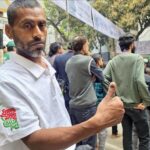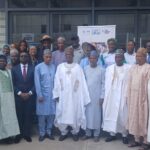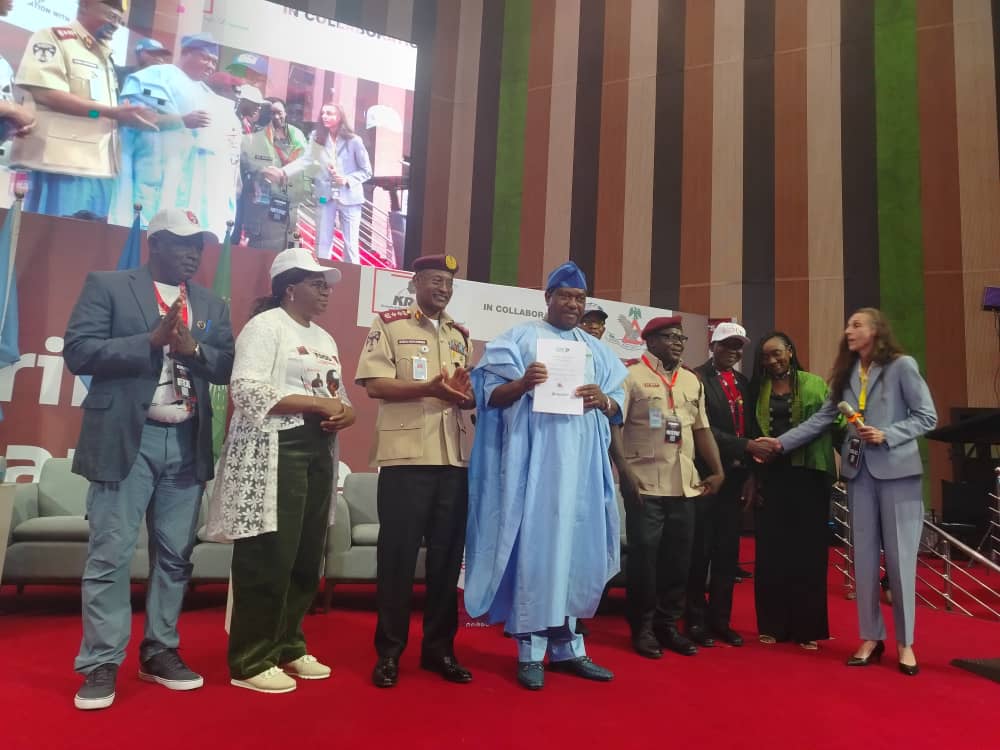By Ibironke Ariyo
Adams Oshiomhole, Chairman of the Senate Committee on Interior, has called for urgent action to curb road traffic deaths in Nigeria.
Oshiomhole made the call at the International Day of Remembrance of Road Traffic Victims Conference in Abuja.
Recounting personal experiences of loss, he highlighted the devastating impact of road accidents on families, students, and communities.
He emphasised that road safety required both personal responsibility and institutional enforcement.
He said that everyone could do something different when on the road.
He urged that drivers should be properly tested before operating vehicles and that authorities should ensure compliance.
Oshiomhole criticised the misuse of sirens and technical vehicles by unauthorised individuals and stressed the need for a unit to determine vehicle roadworthiness.
He pointed out the dangers posed by unqualified drivers and second-hand vehicles and called on authorities to regulate imports to prevent accidents.
The senator also drew attention to unsafe driving practices observed abroad and compared them with lapses in Nigeria.
He called on law enforcement agencies to enforce traffic regulations strictly and to ensure that offenders were prosecuted to serve as deterrents.
Oshiomhole encouraged Nigerians to raise awareness, uphold the law, and educate youths about road safety.
He said that the day was not one for lamentation but for action, and he urged Nigerians to pray for the youths and the safety of the roads.
He also commended the FRSC and its committee members for their efforts in promoting driver competence and road safety.
Oshiomhole urged Nigerians and authorities to combine vigilance, education, and enforcement to prevent further loss of lives on the nation’s roads,
He stressed that action must replace grief to safeguard lives.
In her goodwill message, the Chief Justice of Nigeria (CJN), Justice Kudirat Kekere-Ekun, called for urgent and collective action to protect victims of road traffic crashes.
Kekere-Ekun noted that every accident was preventable.
The CJN was represented by Halimat Turaki.
She commended the visionary initiative of Kwapda’as Road Safety Demand (KRSD) Foundation, which she described as a living memorial offering hope, legacy, and healing to countless families across Nigeria and beyond.
She noted that the conference challenged stakeholders to view road accidents not as inevitable but as preventable.
Kekere-Ekun urged policymakers, law enforcers, health professionals, and the judiciary to work together in building a culture of accountability, compassion, and strategic intervention.
The CJN also praised the advocacy for the establishment of Trauma Recovery Centres for road crash victims, describing it as a monumental step toward justice, dignity, and societal responsibility.
“Behind every crash lies not just justice but the need for fear, desolation, responsibility and law,” she said.
Emphasising the moral duty of the judiciary, Kekere-Ekun stated that the law must not only address negligence but also protect the dignity of victims and their families.
She said that the lessons from the KRSD Foundation and similar initiatives inspired a future where human lives were safeguarded and society was more humane.
In her remarks, Justice Monica Dongban-Mensem, President of the Court of Appeal, called for firm accountability for reckless road use and stronger protection for victims of road crashes across Africa.
Dongban-Mensem said that the continent must move road safety issues to a higher level.
“Africa does not manufacture vehicles. We import and reuse them, yet lose lives every day,” she said.
Dongban-Mensem recounted losing her son in a crash, noting that many families endured similar pain.
“The silence of victims and families worries me. Some are afraid to speak.
“That is why we needed this conference, a place where voices can be heard and healing can begin,” she said.
The Appeal Court President said the organising team conducted trainings for drivers, school visits, commercial motor parks outreach and national road campaigns to raise awareness.
Dongban-Mensem said collaboration with the private sector was crucial and confirmed the FCT Minister’s allocation of land for a trauma centre.
She added that several governors and traditional leaders had shown commitment to the project, expected to provide relief for victims needing long-term care.
Dongban-Mensem lamented that survivors often struggled with physical disabilities, emotional trauma and financial hardship.
“Many stay indoors with artificial limbs and no support. They are not beggars.
“Their lives have been reduced by circumstances we can change,” she said.
She urged African governments to enact affordable, updated and enforceable road safety laws, emphasising the need for emergency care legislation.
She, however, insisted that individuals must also be held accountable for bad conduct on the roads.
She expressed the hope that the conference, the first, focused on African victims, would not be the last.
“We need laws compelling hospitals to respond immediately. Many die because attention comes too late.
“Even with good roads in Abuja, drivers still behave recklessly. People must face consequences for dangerous behaviour,” she emphasised.
“Let us keep our citizens safe, support victims and ensure the stories we have shared this week yield lasting impact,” she said.
Dongban-Mensem prayed for survivors, families and participants, saying “May none of you ever become victims.” (NAN)(www.nannews.ng)
Edited by Augusta Uchediunor/Kevin Okunzuwa












